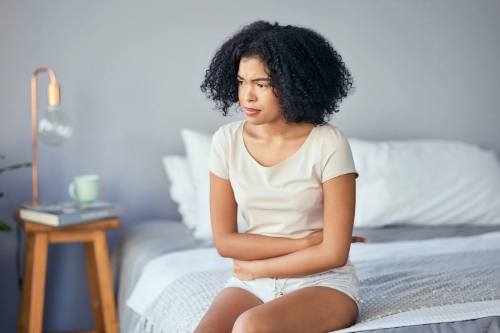Pain during ovulation? “Mittelschmerz” might be the reason why
Some women experience pain during ovulation. Two doctors explain its causes, what it feels like, and how to know if it requires medical attention.

For those of us who have a uterus, menstrual cramping and PMS are probably the most annoying parts of periods (hello, mood swings and crippling pain). But there’s a lesser-known kind of menstrual-cycle misery that some of us have the “pleasure” of experiencing: pain during ovulation.
Also known as mittelschmerz (German for “middle pain”), ovulation pain tends to happen about two weeks before your period starts. So, consider it an early period present—like, the kind of present that you didn’t want and really wish you could return.
Backing up for a sec: Ovulation occurs when a mature egg is released from the ovaries into the fallopian tube, sending it down to the uterus where it will either get fertilized or get expelled during your period. But the act of ovulation is pretty dramatic—an ovarian follicle or cyst holding an egg has to stretch and rupture in order to release it. And for some women, that can be painful AF.
What exactly does pain during ovulation feel like?
“The process of ovulation is indeed that [you’re] popping a little cyst,” says Mary Jane Minkin, MD, a clinical professor of obstetrics and gynecology and reproductive sciences at Yale University. And some women can feel that “pop” as a distinct discomfort in the form of that “middle pain,” says Leena Nathan, MD, an assistant clinical professor and OB/GYN at UCLA Health. She adds that bleeding or fluid released from the popped follicle can also irritate the pelvis and potentially cause pain during ovulation.
The good news: Pain during ovulation doesn’t last long—anywhere from a few hours to a few days is normal—and there are a few telltale clues that indicate this is what you’re feeling.
“Ovulation pain can feel like a sharp cramp or a dull ache,” say Dr. Nathan. “It is usually felt on one side of the pelvis or the other, and the pain is usually quite low in the abdomen.” It’s a bit more of a targeted, specific pain, making it a bit different from your standard period cramps, which can radiate from the abdomen to the lower back and thighs.
And if the pain you feel coincides with breast tenderness, spotting, or a clear, egg-white type discharge—which Dr. Nathan says are tell-tale signs you’re in the ovulation phase of your cycle—odds are you’re experiencing ovulation pain.
If mittelschmerz pain is a sudden new surprise in your life (yay), changing birth control methods may be to blame. The Paragard IUD, for example, doesn’t interfere with ovulation to prevent pregnancy (the copper-coated device instead interferes with sperm movement, making it hard for them to reach an egg), so it likely won’t help much for ovulation pain. Dr. Minikin adds that the progesterone-coated Mirena (a hormonal IUD option) likely won’t improve ovulation pain symptoms either because while it can help make periods lighter (or disappear altogether), a person is technically still ovulating on this form of birth control.
How to deal with pain during ovulation
If your abdominal pain is mild during your menstrual cycle, Dr. Nathan says that there’s likely nothing to worry about. A heating pad or over-the-counter pain meds will usually help to relieve them. And again, the pain should only last for a few days tops.
But let’s say the pain is more intense, or happens at other times during your cycle. (For most women, ovulation happens halfway through their cycles, about two weeks before your next period—you can usually figure out yours with a period-tracking app.) In that case, Dr. Nathan recommends visiting your gynecologist.
“We may want to order an ultrasound to further evaluate the discomfort,” she says. Sometimes, pain in the lower abdomen can indicate more serious conditions, like abnormal ovarian cysts, an ectopic pregnancy (where a fertilized egg implants outside the uterus and can cause life-threatening bleeding), or endometriosis—a condition wherein the uterine lining grows outside of the uterus.
If the pain’s intolerable, Dr. Nathan says you should head to the ER. “Rarely, there can be a lot of bleeding or a large cyst that ruptures, which could need emergency surgery,” she explains. You could also be suffering from appendicitis, which presents as pain on the right side of your abdomen and is sometimes accompanied by nausea and vomiting.
For people who just have abnormally painful ovulation (#blessed) and other more serious issues have been ruled out, Dr. Minkin says it could be worth going on birth control pills. The pill prevents pregnancy by suppressing ovulation, she says, and thus can be an effective way to prevent severe ovulation pain.
If you’ve determined that ovulation pain is, in fact, the source of your mid-cycle woes, know there’s a silver lining—it’s a great excuse to schedule some extra hygge time into your monthly calendar.
Additional reporting by Alanna Nunez.
This piece was originally posted on December 13, 2018. It was updated on March 21, 2019.
If period cramps regularly get you down, you may find relief by trying these yoga poses—or having an orgasm (!)










